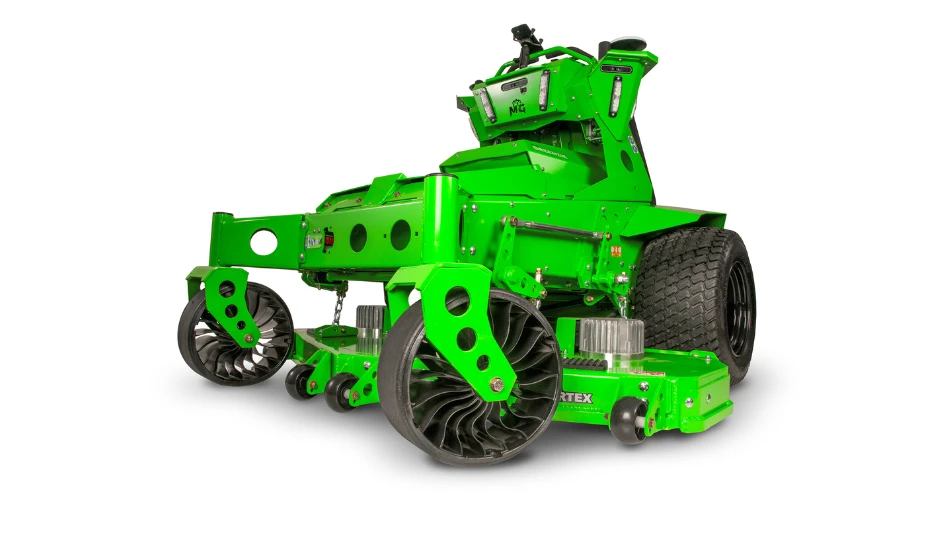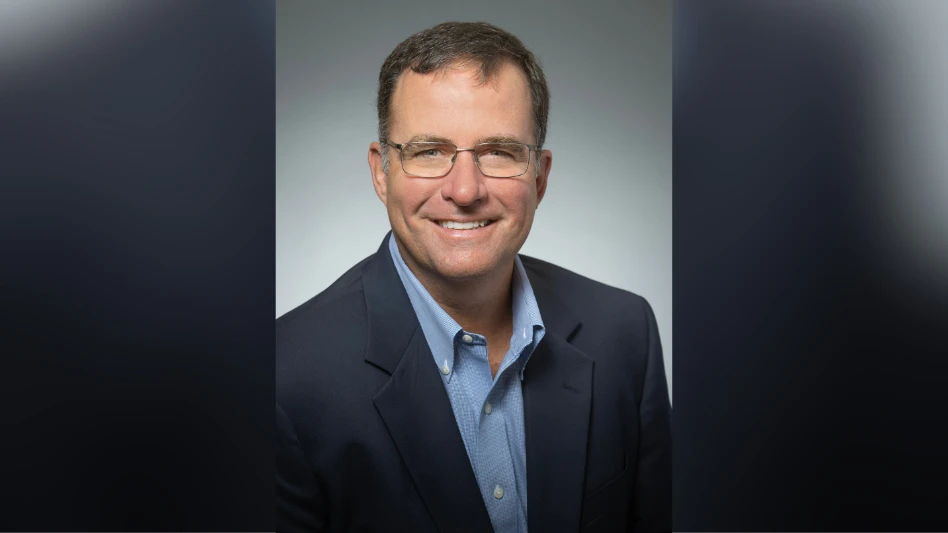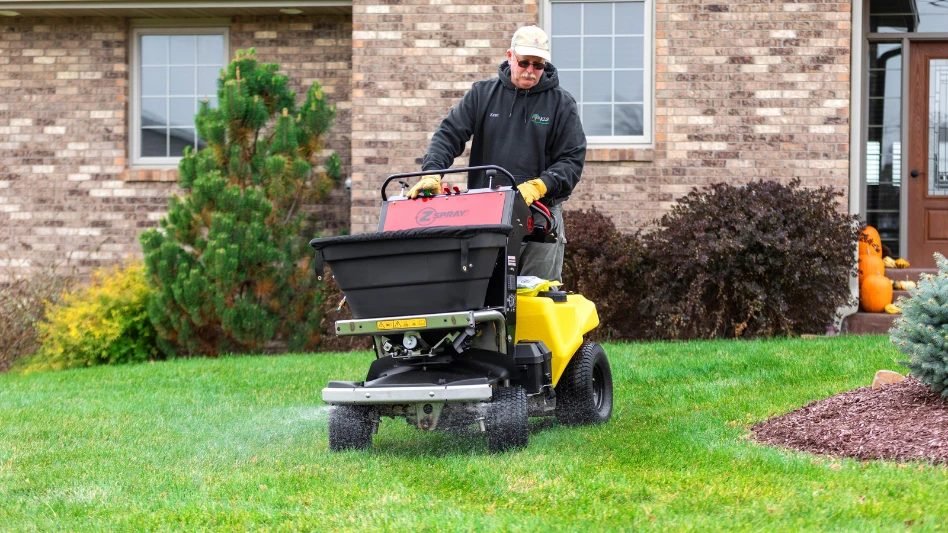|
“Once it’s there, it’s very easy to diagnose because of the fluffy growth,” French says. “The fungus is actually growing inside but also outside the leaf. At the beginning, you might only see it as a yellow spot. You’re not going to see that fluffy growth when the fungus first attacks. But, later on, you’ll see that fluffy growth turn more into a grayish color and then potentially, if it’s really warm, it will actually produce some fungal structures that allows for the fungus to survive from one year to the other.” Where and when: “The ideal scenarios for powdery mildew development are cool temperatures in the mid-60s, poor air circulation, shady areas and high humidity. “You are more likely to find powdery mildew in cool season grasses and the spring, summer – in some locations – and fall, when temperatures are in the low 40s Fahrenheit, and as high as in the low 70s Fahrenheit,” he says. The type of grass you have may also factor in to the likelihood of a powdery mildew attack. “Although all turfgrass species can be hosts to this fungus, some Kentucky bluegrass varieties, perennial ryegrass, bermudagrass, zoysiagrass and some fescues tend to be more prone to the attack by the powdery mildew fungus,” French says. Management: In locations where there is too much shade for grass to do well, shade-tolerant ground covers, such as hostas may be planted. Other management strategies suggested by French include: providing good air circulation by pruning shrubs and trees, increasing sunlight by pruning shrubs and trees, avoiding excess nitrogen fertilization and watering deep and not too frequent while making sure the grass is not drought-stressed. Your mowing practices can also help with managing the disease. “A lawn that is too short can stress plant growth while a lawn that is too high can provide the right niche for humidity and lack of aeration,” he says. “Fungi thrive under high moisture, dew (and) condensation because that promotes fungal growth and germination of spores.” If you choose to use fungicides look for products that contain propiconazole, myclobutanil, triadimefon, fenarimol or manozeb. If you’re looking for an organically labeled fungicide, there are products that contain potassium bicarbonate. Sponsored Content Gaeta Recycling: Driving efficiency and sustainability with SENNEBOGEN material handlersGaeta Recycling, a family-owned business in Paterson, New Jersey, has been a cornerstone of the community since 1935. Led by fifth-generation owner and President Michael Portannese, the company specializes in solid waste and recycling. It manages 30 municipal contracts and handles up to 720 tons of material daily at its transfer station. Sponsored Content Gaeta Recycling: Driving efficiency and sustainability with SENNEBOGEN material handlersGaeta Recycling, a family-owned business in Paterson, New Jersey, has been a cornerstone of the community since 1935. Led by fifth-generation owner and President Michael Portannese, the company specializes in solid waste and recycling. It manages 30 municipal contracts and handles up to 720 tons of material daily at its transfer station. Sponsored Content Gaeta Recycling: Driving efficiency and sustainability with SENNEBOGEN material handlersGaeta Recycling, a family-owned business in Paterson, New Jersey, has been a cornerstone of the community since 1935. Led by fifth-generation owner and President Michael Portannese, the company specializes in solid waste and recycling. It manages 30 municipal contracts and handles up to 720 tons of material daily at its transfer station. Sponsored Content Gaeta Recycling: Driving efficiency and sustainability with SENNEBOGEN material handlersGaeta Recycling, a family-owned business in Paterson, New Jersey, has been a cornerstone of the community since 1935. Led by fifth-generation owner and President Michael Portannese, the company specializes in solid waste and recycling. It manages 30 municipal contracts and handles up to 720 tons of material daily at its transfer station. Sponsored Content Gaeta Recycling: Driving efficiency and sustainability with SENNEBOGEN material handlersGaeta Recycling, a family-owned business in Paterson, New Jersey, has been a cornerstone of the community since 1935. Led by fifth-generation owner and President Michael Portannese, the company specializes in solid waste and recycling. It manages 30 municipal contracts and handles up to 720 tons of material daily at its transfer station. Sponsored Content Gaeta Recycling: Driving efficiency and sustainability with SENNEBOGEN material handlersGaeta Recycling, a family-owned business in Paterson, New Jersey, has been a cornerstone of the community since 1935. Led by fifth-generation owner and President Michael Portannese, the company specializes in solid waste and recycling. It manages 30 municipal contracts and handles up to 720 tons of material daily at its transfer station. Sponsored Content Gaeta Recycling: Driving efficiency and sustainability with SENNEBOGEN material handlersGaeta Recycling, a family-owned business in Paterson, New Jersey, has been a cornerstone of the community since 1935. Led by fifth-generation owner and President Michael Portannese, the company specializes in solid waste and recycling. It manages 30 municipal contracts and handles up to 720 tons of material daily at its transfer station. “Whenever you use a chemical product,” French says, “make sure to follow label directions for use and make sure that it is labeled for turfgrass.”
|
Get curated news on YOUR industry.
Enter your email to receive our newsletters.
Explore the March 2011 Issue
Check out more from this issue and find your next story to read.
Latest from Lawn & Landscape
- How I built a Top 100 company
- Grow your business with mosquito control
- LandCare adds 2 branches in SoCal, promotes Aleman to branch manager
- Spray them away
- PERC helps debut propane direct-injection fuel system at ACT Expo 2025
- Retargeting Ads – A Secret Weapon for Growing Your Lawn Care Business
- Leading a growing company
- Project EverGreen launches Clean Air Calculator







